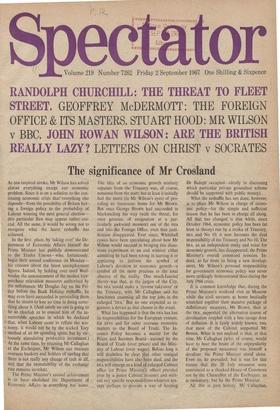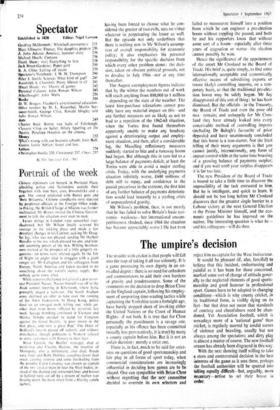The significance of Mr Crosland
At one inspired stroke, Mr Wilson has solved almost _everything except our economic problem. Since it is on a solution to the con- tinuing economic crisis thaeeverytbing else depends—from the possibility of Britain hav- ing a foreign policy to the probability of Labour winning the next general election— this particular flaw may appear rather cru- cial. All the same, it would be wrong not to recognise what the latest reshuffle has achieved.
In the first place, by 'taking over' the De- partment of Economic Affairs himself the Prime Minister has publicly demonstrated to the Trades Unions—who, fortuitously, begin their annual conference on Monday— his concern about the latest unemployment figures. Indeed, by holding over until Wed- nesday the announcement of the modest hire- purchase relaxation measures authorised by the unfortunate Mr Douglas Jay on the Fri- day before the Bank Holiday reshuffle, he may even have succeeded in persuading them that he means to lose no time in doing some- thing about it. (And surely no one is going to be so churlish as to remind him of the in- numerable speeches in which he declared a∎ that, when Labour came to reflate the eco- .. nomy, it would not be by the wicked Tory method of an HP spending spree, but by vir- • tuously stimulating productive investment.) At the same time, by retaining Mr Callaghan at the Exchequer, Mr Wilson can reassure overseas bankers and holders of sterling that there is not really any change of tack at all, and that the immutability of the exchange rate remains inviolate. The idea of an economic growth ministry separate from the Treasury was, of course, nonsense from the start; but at least it initially had the merit (in Mr Wilson's eyes) of pro- viding an innocuous home for Mr Brown. But once George Brown had succeeded in blackmailing his way (with the threat, for once genuine, of resignation at a par- ticularly awkward moment) out of the DEA and into the Foreign Office, even that justi- fication disappeared. Ever since. Whitehall cynics have been speculating about how Mr Wilson would succeed in bringing this disas- trous experiment to an end without either admitting he had been wrong in starting it or appearing to jettison the symbol of Labour's devotion to economic growth—a symbol all the more precious in the total absence of the reality. One much-fancied theory was that, in the jargon of the City. the DEA would make a 'reverse take-over' of the Treasury, with Mr Callaghan and his henchmen assuming all the top jobs in the enlarged 'DEA? But no one expected as in- genious a device as that chosen in the event.
What has happened is that the DEA has lost its responsibilities for the European venture, for EFTA and for other overseas economic matters to the Board of Trade. The In- comes Policy becomes a matter for the Prices and Incomes Board—assisted by the Board of Trade (over prices) and the Mini- stry of Labour (over wages). Before long it will doubtless be clear that other vestigial responsibilities have also been shed, and the DEA will emerge as a kind of enlarged Cabinet office (or Prime Minister's office) presided over by a junior Cabinet minister and with- out any specific responsibilities. whatever (ex- cept perhaps to provide a way of keeping Dr Balogh occupied—ideally in discussing which particular private groundnut scheme should be supported with public money).
What the reshuffle has not done, however. is to place Mr Wilson in charge of econo- mic policy—for the simple and sufficient reason that he has been in charge all along. All that has changed is that while, since October 1964, economic policy has been (at least in theory) run by a troika of Treasury, DEA and No 10, it now becomes the dual responsibility of the Treasury and No 10. The DEA, as an independent entity and voice for economic growth, has disappeared; the Prime Minister's overall command remains. In- deed, so far from its being a new develop- ment, Mr Wilson's personal responsibility for government economic policy was never more strikingly demonstrated than during the July 1966 crisis.
It is common knowledge that, during the Prime Minister's weekend visit to Moscow while the civil servants at home hectically scratched together their massive package of deflationary measures, Mr Brown, then at the DEA, supported the alternative course of devaluation coupled with a less savage dose of deflation. It is fairly widely known, too, that most of the Cabinet supported Mr Brown. What is not realised is that, at that time, Mr Callaghan (who, of course, would have to bear the brunt of the unpopularity of the proposed measures) was himself a devaluer, the Prime Minister stood alone. Even so, he prevailed; but it was for this reason that the 20 July measures were announced to a shocked House of Commons not by the Chancellor of the Exchequer, as is customary, but by the Prime Minister.
All this is past history. Mr Callaghan, having been forced to choose what he con- sidered the greater of two evils, sees no virtue whatever in perpetrating the lesser as well. But the episode not only underlines that there is nothing new in Mr Wilson's assump- tion of overall responsibility for economic policy; it also emphasises his personal responsibility for the specific decision from which every other problem stems : the deci- sion, taken on obscure political grounds, not to devalue in July 1966—nor at any time thereafter.
The August unemployment figures indicate that by the winter the numbers out of work wilt reach anything from 800.000 tot million —depending on the state of the weather. The latest hire-purchase relaxations cannot pos- sibly have any material impact on this—and any further measures are as likely as not to lead to a repetition of the 1962-63 situation, when the Tories first found themselves apparently unable to make any headway against a deteriorating output and employ- ment situation, and then, after a considerable lag, the Maudling reflationary measures suddenly started to bite and a runaway boom had begun. But although this in turn led to a large balance of payments deficit, at least the Tories were able to avoid a major sterling crisis. Today, with the underlying payments situation infinitely worse, £600 millions of debt still to repay, and confidence in the pound precarious in the extreme, the first hint of any further balance of payments deteriora- tion would lead instantly to a sterling crisis of unprecedented gravity. . Mr Wilson's problem, then, is, not merely that he has failed to solve Britain's basic eco- nomic- weakness--her international uncom- petitiveness. (Indeed, since 1964 the situation has became appreciably worse.) He has even failed to manoeuvre himself into a position from which be can engineer a pre-election boom without toppling the pound; and both he and his supporters know that -without some sort of a boom--especially after three years of stagnation or worse--the election cannot possibly be won.
Hence the significance of the appointment of the smart Mr Crosland to the Board of Trade. His brief is, quite simply, to find some internationally acceptable and economically effective means of subsidising exports or (more likely) controlling imports, on a tem- porary basis, so that the traditional pre-elec- tion boom may be safely begun. Mr Jay disapproved of this sort of thing : he has been dismissed. But the officials—in the Treasury. the Board of Trade and even the poor old DEA— remain; and unhappily for Mr Cros- land they have already looked into every conceivable method of controlling imports (including Dr Balogh's favourite of prior deposits) and have unanimously concluded that this horse is a non-starter. Not the least telling of their many arguments is that you cannot justify, internationally, any form of import control while at the same time boasting of a growing balance of payments surplus; and if you wait until your surplus disappears it is far too late.
The new President of the Board of Trade is bound to take a little time to discover the impossibility of the task entrusted to hint But he is intelligent, and quick to learn. It should not be too long before Mr Crosland discovers that the peatest single barrier to a Labour victory at the next General Election is the Prime Minister himself, and the..eco- nomic --guidelines he has imposed on the nation: The interesting question is what he— and his colleagues--will do then.































